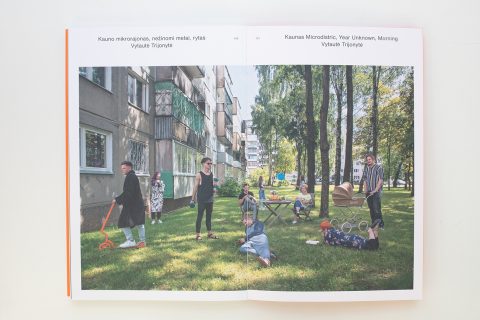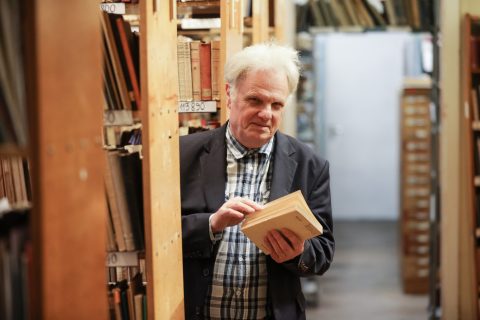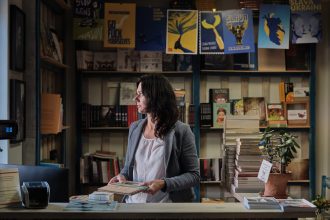On an unusually cold early autumn afternoon, we met with poet, journalist, long-time editor-in-chief of Nemunas and head of Kauko laiptai publishing house Viktoras Rudžianskas. With 2008 Poetry Spring laureate, who also received an award at this festival for disseminating literature, we discussed the life and work of a small publishing house.
Kauko laiptai has been existing for over a decade. What prompted the founding of the publishing house in 2010? Why did you choose that particular name? Are these stairs important to you as a Kaunas resident?
Things just happened. When I started working in the editorial office of Nemunas, the magazine was discontinued, and they gave us an ultimatum: either Nemunas will become a weekly or it will seize to exist. Although I was not the first one to receive this offer, I started creating a weekly magazine. We called its literary part Kauko laiptai (Kauko Stairs) and a part dedicated to other arts: Tiltai (Bridges). Later, the structure of the publication changed. Around that time, I founded a publishing house, a Všį Kauko laiptai, so the name simply remained.
These Kauko stairs have been close to my heart since childhood. It is somewhat romanticized. Also, the editorial office of Nemunas was close to these stairs.
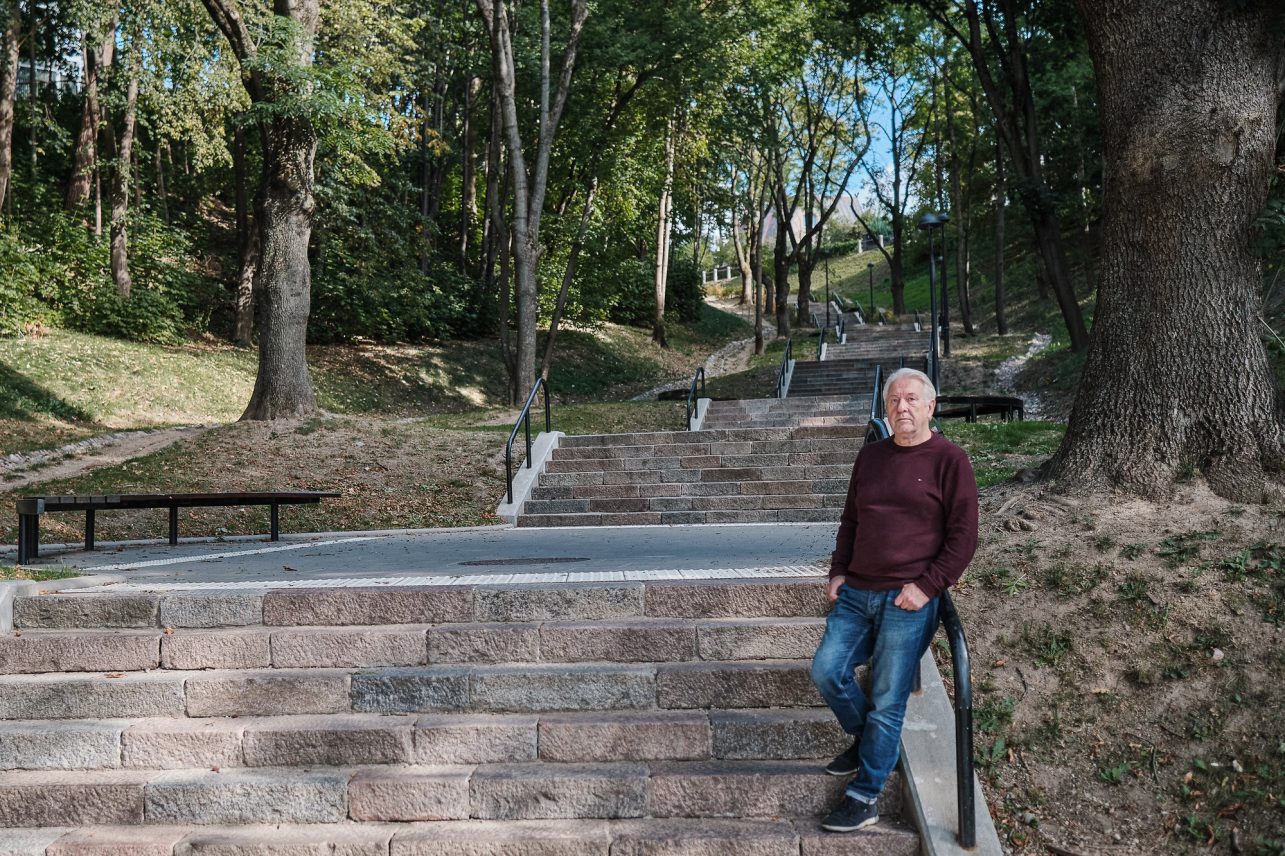
This year, the publishing house published nine books. And how many were published in a decade?
Currently, the 135th book is being prepared for printing.
Let’s talk about the content of the books. Your published writers can be put into categories that showcase your personal work very well: poetry and journalism. Does Kauko laiptai prioritize the members of the Writers’ or Journalists’ Union?
It is not necessary to belong to any union. The most important thing is the quality of work. By the way, the age or place of residence of the author does not matter. It warms my heart when we publish a good debut book, when young authors trust the publishing house. Some successful examples of collaboration in recent years include the debut poetry books by Tomas Vyšniauskas and Ieva Rudžianskaitė – both were awarded Zigmas Gėlė-Gaidamavičius prize for their debuts; Lina Simutytė’s book of short stories, which received the Jurga Ivanauskaitė prize and was included in the top five best prose books of the year. Lina’s book is a kind of exception for Kauko laiptai, apparently, the only prose debut. Although I do not ignore prose or essays and Kauko laiptai publishing house has indeed published books in these genres, I have a soft spot for poetry. People might sense this inclination and so poetry collections make up about 80 percent of all the publishing house’s books. Deliberately chosen niche. A good niche. You don’t need to worry about competition with other publishing houses, you don’t need to expect big earnings, you don’t need to dream about where to put the earned money [laughs].
It’s no secret that you belong to the Writers’ Union. Do you have long-time union friends with whom you collaborate in the publishing house? Perhaps you prefer your colleagues?
I feel an obligation to publish my colleagues’ books, but I don’t really have any particular preference. I don’t think that colleagues would give special preference to Kauko laiptai either. As a publisher, the foundation of my relationship with the author is their work. A perfect example is the collection of Ludvikas Giedraitis’ collection of poems Dėl žodžio gimtojo (For the Native Word). Although we don’t know each other (he is a little-known author from an older generation, even a bit older than me) it did not stop him from making his debut in Kauko laiptai.
Manuscripts, a few phone conversations, and that’s enough to know if the personality is interesting. A former deportee living in Vilnius. His book is interesting and relevant because the author does not exploit the topic of exile, its everyday life and similar things. He does not emphasize personal grievances but writes about preserving the mother tongue in any circumstances. Language is like a home for him, and he cherishes it. As poet Jonas Kalinauskas has noticed, this author’s work has similarities with the work of Antanas Kalanavičius. I would also add that this connection is not easily tangible, rather more metaphysical, sort of sensed.
Kauko laiptai has good debut writers, who later choose other publishing houses only to come back to us after that. And that is normal. Of course, it happens that sometimes books of more popular genres are published by other publishing houses, while poetry is published by Kauko laiptai. That’s why we don’t have any conflicts either. Poetry publishing, as I mentioned, is my choice. For a thousand and one reasons, but I wouldn’t want to explain myself to people.
Let’s go back to your Nemunas days. How does the work of an editor differ from your duties as a head of Kauko laiptai publishing house?
They are practically the same. Only in Kauko laiptai I usually edit the books myself; I am both a driver and a distributor, I often contribute to proofreading, etc. Such is the specificity of a small publishing house. I feel like I work in a small publishing house, although some wholesale distributors consider Kauko laiptai a medium-sized publisher based on the volume of books we publish. Should I be bothered? Of course, the work put in and the salary ratio is not balanced but poetry and publishing it pay off in a different way – it provides a sense of freedom. On the other hand, I am not the only one. Other small publishing houses are staffed with passionate people too.
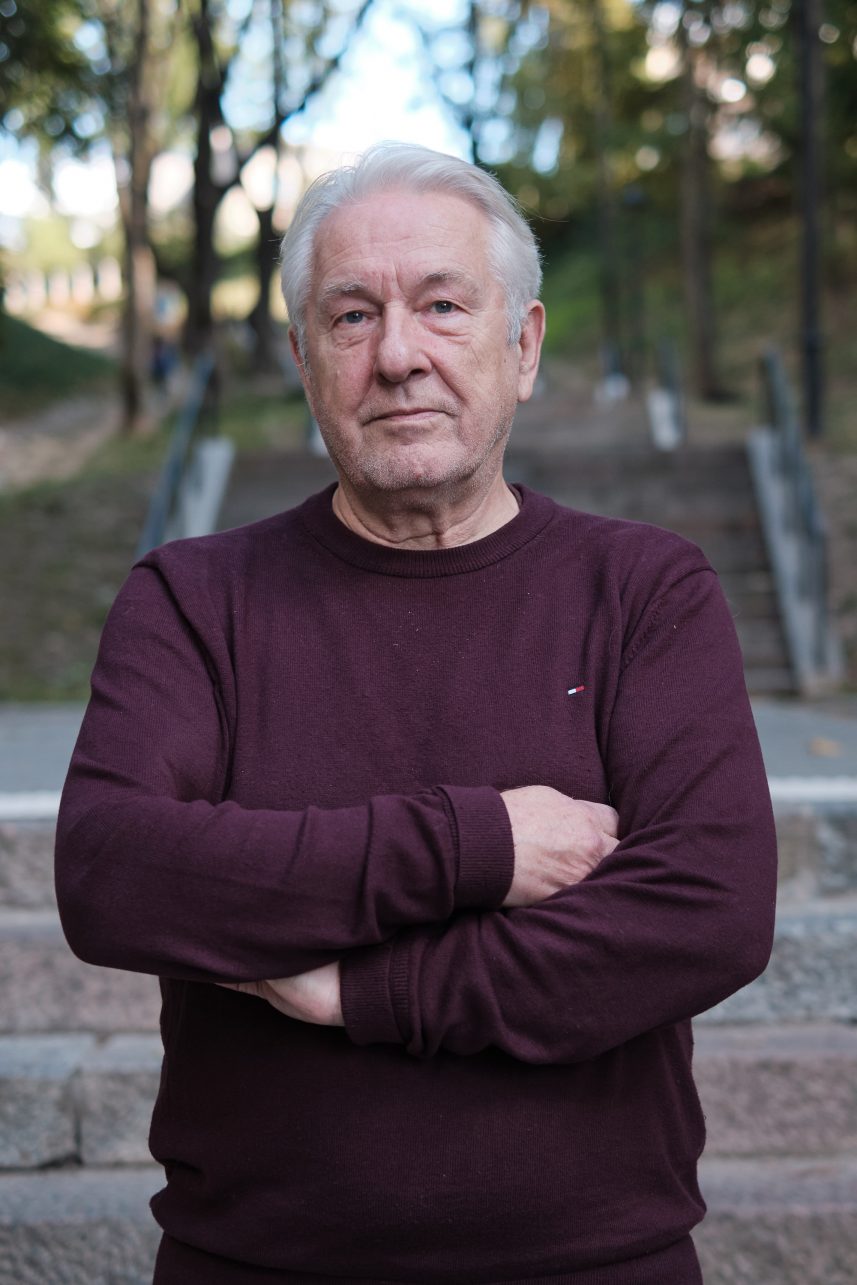
The works of debuting poets published by your publishing house often receive awards. It can be said that cooperation with Kauko laiptai is the first step towards recognition. Does the publishing house look for writers or writers approach the publishing house?
Maybe it’s a coincidence. It could be published by Lithuanian Writers’ Union’s publishing house or a different one. When the book is good, the “coincidence” happens. My job as an editor is to sense wat that good book is and publish it. You don’t have to look for poetry that you like personally, it is more important to be tolerant of different types of poetry. You need to feel it and rationally understand that the book is written well and put your personal taste aside. When I’m a reader, my taste is visible but when I am an editor or a publisher, it is necessary to understand that it is a collection of poems not just texts, who look like poems.
The publishing house’s list of books is dominated by Lithuanian authors, but you recently published the poetry of Tomasz Snarski from Poland, Semyon Khanin from Latvia and Jaan Kaplinski from Estonia. When did your collaboration with foreign poets began. Do you plan to do it more often in the future?
I am not purposefully engaged in promoting foreign authors, it happens naturally. I am approached by translators. And the whole friendship with foreign authors started by chance, in cooperation with Georgian poets. I have published an almanac of their work. Later, while visiting Georgia during Poetry Spring, I was asked to take care of Chabua Amiredjibi and publish his novel Son of the Moon. Later, he translated a rather prominent Georgian figure, a serious poet and translator Giorgi Lobhanidze. He had even translated The Quran from the original into Georgian. Our friendship developed into the book titled Šventofobija (sacrophobia).
Let’s talk about the behind the scenes of the work. What is the process from the first contract to the published book? How long does it take for the book to reach the reader?
Let’s say we publish an average of 10, 16 or 17 books a year – that’s a lot of work. Well, even if you have to publish one book a month on average, it’s a lot of work. Most of the time I edit myself, and I always proofread, whether it’s a 100-page book of poetry or a 400-page novel. There is no book that I have read less than three times. The first read is to get acquainted; the second time is for editing and the third is for proofreading. That’s the behind the scenes.
Do you pay much attention to book covers?
We have our artist, Inga Paliokaitė-Zamulskienė. I don’t mind if the author have their own artist, but it happens rarely.
Sometimes the author wants illustrations by a specific artist. And in fact, they communicate quite well with the texts, but I would like them to be a bit more modern… But you know, time flies, trends and tastes change. It may turn out after some time that the illustrations fit the book very well and they will look fresh based on the saying that new is a well-forgotten old.
Truth be told, I do not follow trends too closely. I simply cannot keep up – they change too fast. For me, the overall visual system of the publishing house is more important, so that attentive readers, once seeing the book, would understand that it was published by Kauko laiptai.
This is ensured by I. Paliokaitė-Zamulskienė, who is thorough and diligent and always makes several versions of a cover. She makes a great colleague because she reads the texts she illustrates. I can often tell which poem became the basis for the cover.
Kauko laiptai has published three collections of your own poems. Isn’t it strange to publish your books in the same publishing house?
Twenty years ago, it would have been very strange. There were all kinds of taboos at that time. When I came to Nemunas, I spoke to Romualdas Rakauskas, who categorically said that one shouldn’t print their own work. It comes from the old days. Now I see a different situation: people often praise me for publishing books in Kauko laiptai because, according to them, if I published them elsewhere, it would mean that I don’t trust Kauko laiptai… I also think that this rather skeptical question also depends on the people who ask it. On the other hand, when you self-publish a book, you don’t have to fight with anyone, for example, if you find an error in the text.
An author and a person in general, in my opinion, must be free.
A published book is half the work. How do you develop a distribution strategy? Do you have contracts with large online bookstores, or do you prefer niche ones?
I take it to Kolibris [laughs]. We also sell books online through Patogu pirkti and all other distribution to various bookstores is handled by the so-called dealer UAB Ramduva. It distributes our books to all major bookstores.
Poetry publishing has this nuance: the best distribution is the author’s poetry evening. If you manage to organize a lot of them, the book goes faster, if you are not very successful or the author does not want to communicate with the readers, then it lingers a bit. I have had a certain relationship with books since childhood, so I stubbornly carry them around the fairs until they all find their homes. It would be more rational and simpler to act modernly, like disposing of them after several years, but I can’t do that. A book must reach a reader and then its fate stops depending on me.
I have read somewhere that publishing houses manage to sell close to a thousand poetry books of a particular title per year. I’ll be honest: I don’t believe it. Even in big countries, such a task is not easy for the publisher.
What’s your take on book fairs?
Participating in book fairs is important because it allows you to introduce the reader to a specific author and the latest books. Since the founding of the publishing house, we have not missed the Vilnius Book Fair, and we also do the promotion work in other towns’ – Klaipėda, Šiauliai, Panevėžys – events. We do not bypass the centers of smaller districts, for example, Zarasai, and Ukmergė. Often, few people know about them, except for local residents. And there are about fifteen of them a year. Sometimes the distribution is better, sometimes worse.
But this, let’s say, practical level of dissemination gives me more confidence than virtual space or social networks. Not for fear of innovation. It’s just experience. There have been cases where a teaser about the newly published book shared on Facebook received a thousand likes but the book did not find its readers in three years. And the opposite has also happened: there was little interest in the book on social media (even after two years it still has only 200 likes) but the book has been almost sold out with only several copies left.

So why is it important for you to have a publishing house’s page on Facebook? I assume you see some benefits in having one.
It is not very important, although it has already become a kind of fashion or even a requirement. I think that having to write various projects and not having a public page in the digital space, makes it more difficult to get support, to be noticed. Although it is not Facebook that drives poetry books to the top. At least not yet. I think that in the future it will win over the so-called level or practical dissemination.
What makes Kauko laiptai publishing house unique?
One of the unique features is tolerance for the author. In the contracts with the authors, Kauko laiptai does not limit the copyright. It is written in the contract that the publishing house has no claims regarding the reprinting of the book elsewhere in different languages, turning it into a stage production, etc. We also do not oblige the author to publish their books only in Kauko laiptai for several years. An author and a person in general, in my opinion, must be free. Especially when it comes to creativity.
Do you feel that the publishing house has changed the landscape of Lithuanian fiction?
I think I helped some authors to enter the world of literature, although this process is probably much older and dates back to 2004 when I started working in Nemunas. Aušra Kaziliūnaitė, Vytautas Stankus, Gvidas Latakas are only a few names whose debut I contributed to. I can call these writers my literary children, after all, I was the first publisher of their books. If today we know these authors, my work wasn’t done in vain. The publishing house helped establish not only the strong debuting poets of the young generation but also, for example, did not overlook the phenomenon of the late Vladas Kalvaitis.
We started working with him when the author was about 80 years old. I knew V. Kalvaitis as an author of epigrams. But once, when I was working in Nemunas he brought some of his short stories to me. I remember I was very interested in their endings: their psychological power was very unexpected. I read a few and I called him, guessing these were not his first short stories. He didn’t argue.
We have come an interesting way with him in a relatively short time. V. Kalvaitis managed to become a member of the Lithuanian Writers’ Union and received prizes, including the Government prize for his novel Sustiprinto režimo barakas (Maximum Security Barrack). This author had to be somehow lured in. I had to carefully connect with him and create mutual trust. He was a deportee, a prisoner in a labour camp, he hid his work and needed special attention and time. At first, we published collections of short stories, only then a novel and the latest work, a collection of short stories. I could compare his Sustiprinto režimo barakas with Balys Sruoga’s Dievų miškas (Forest of the Gods). Although the concentration camps are different – German and Soviet – both authors, having experienced abuse and cruelty, infuse their memories with irony and wit.

